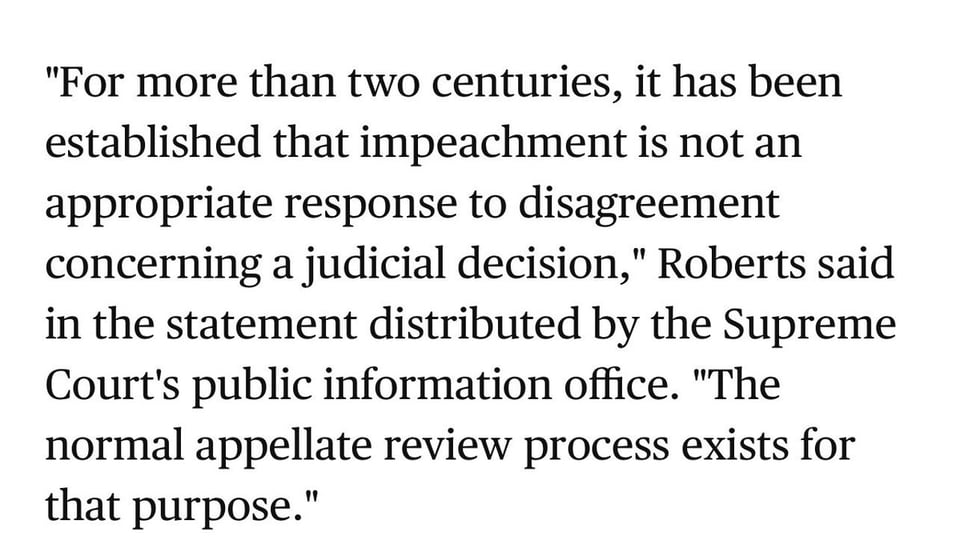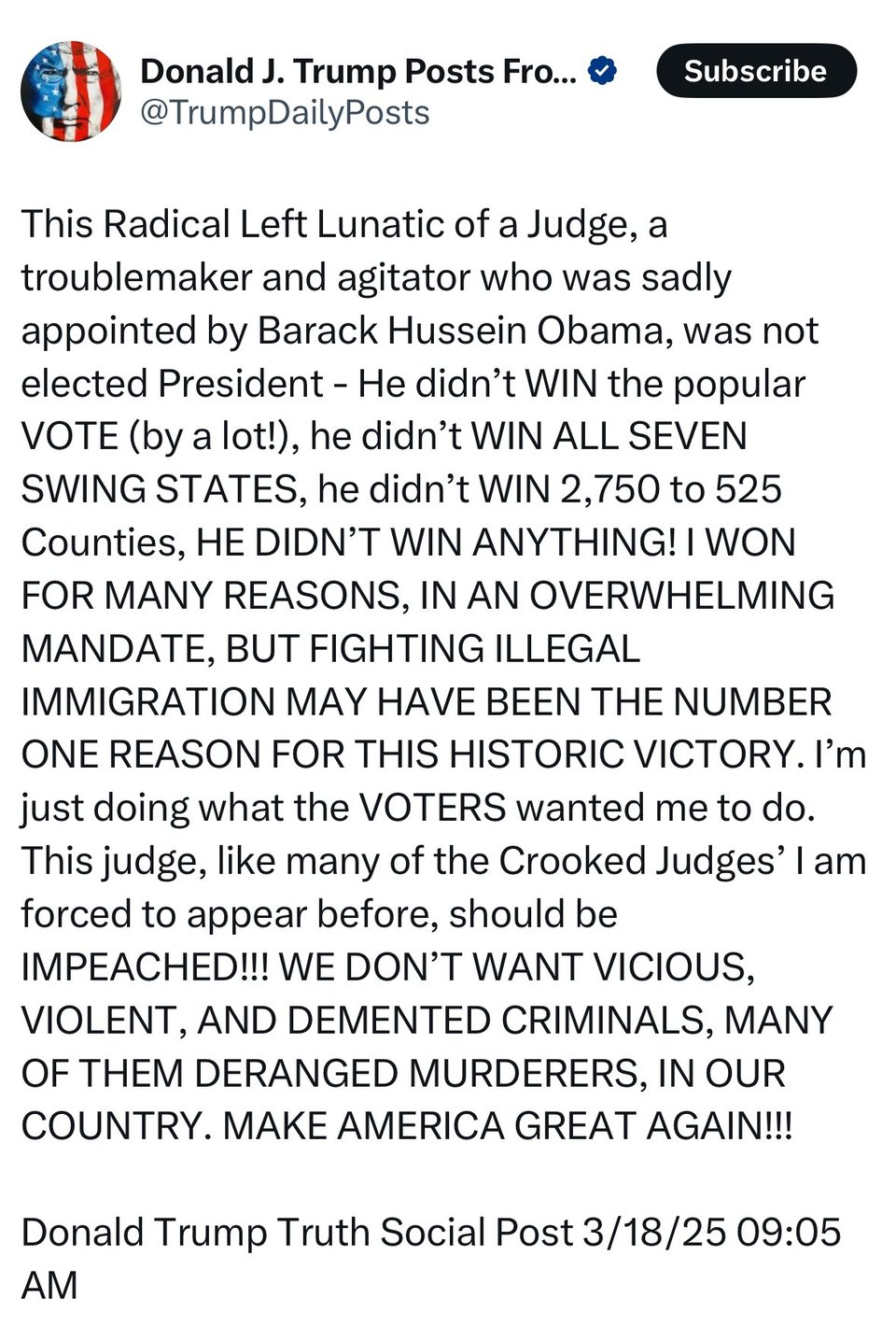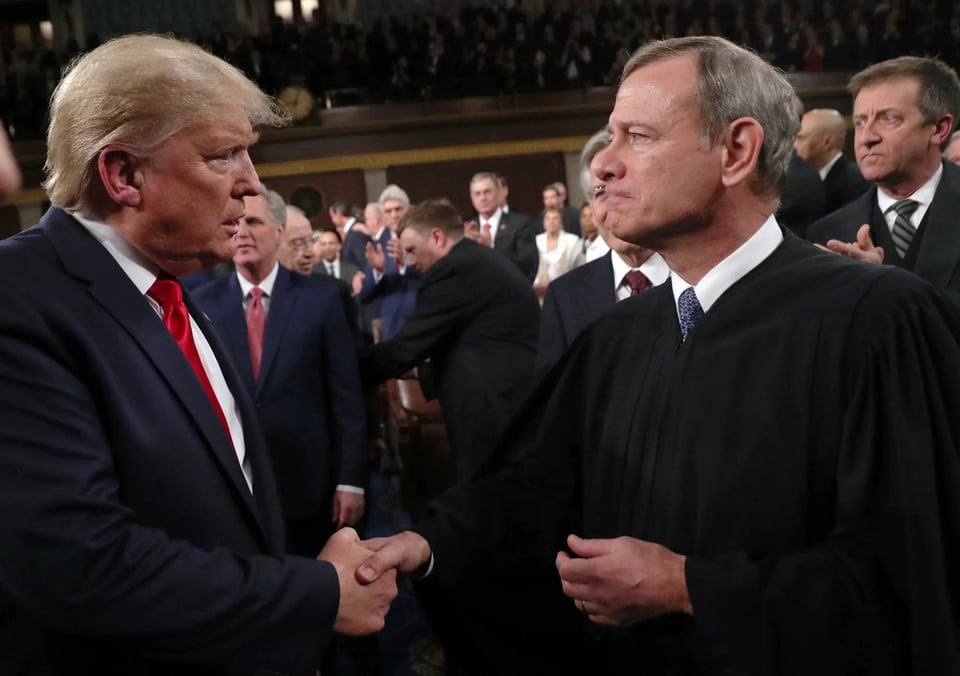Wednesday, March 19, 2025. Annette’s Roundup for Democracy.
The Judiciary finds itself busy.
🚨NEW: Federal Judge Theodore Chuang has blocked Elon Musk and DOGE from dismantling USAID, ruling that they have likely violated the Constitution.
— Protect Kamala Harris ✊ (@DisavowTrump20) March 18, 2025
RETWEET to thank Judge Chuang for standing up for the Constitution! pic.twitter.com/Ittg91D2R7
Judge finds Elon Musk and DOGE's shutdown of USAID likely unconstitutional - CBS News
Washington — A federal judge on Tuesday found that Elon Musk and the White House's Department of Government Efficiency likely violated the Constitution when they unilaterally acted to shut down the U.S. Agency for International Development.
U.S. District Judge Theodore Chuang ruled in favor of a group of more than two dozen unnamed current and former USAID employees and contractors who had challenged the efforts to shutter USAID, which were mounted by DOGE and Musk, a senior White House adviser who President Trump has said is the leader of the task force.
Chuang granted in part their request for a preliminary injunction and said in a 68-page decision that DOGE and Musk likely violated the Constitution's Appointments Clause and separation of powers.
He ordered Musk and task force employees to reinstate access to email, payment and other electronic systems to all current USAID employees and personal services contractors. The judge also prevented DOGE and Musk from taking any action relating to the shutdown of USAID, including placing employees on administrative leave, firing USAID workers, closing its buildings, bureaus or offices, and deleting the contents of its websites or collections.
DOGE and Musk are prohibited under the judge's order from taking any other actions relating to USAID without the "express authorization" of an agency official with legal authority to take the action. The Trump administration is likely to appeal the decision.
"To deny plaintiffs' Appointments Clause claim solely on the basis that, on paper, Musk has no formal legal authority relating to the decisions at issue, even if he is actually exercising significant authority on governmental matters, would open the door to an end-run around the Appointments Clause," Chuang wrote.
He continued: "If a president could escape Appointments Clause scrutiny by having advisers go beyond the traditional role of White House advisors who communicate the president's priority to agency heads and instead exercise significant authority throughout the federal government so as to bypass duly appointed officers, the Appointments Clause would be reduced to nothing more than a technical formality."
Norm Eisen, executive chair of the State Democracy Defenders Fund, which brought the case on behalf of the 26 USAID employees and contractors, said the ruling is an "important victory" against Musk and DOGE.
"They are performing surgery with a chainsaw instead of a scalpel, harming not just the people USAID serves but also the majority of Americans who count on the stability of our government," he said in a statement. "This case is a milestone in pushing back on Musk and DOGE's illegality."
USAID was one of the first agencies that came under scrutiny by DOGE as part of Mr. Trump's sweeping plan to shrink the size of the federal government. Soon after the president returned to a second term, the agency, which was established in 1961, became subject to a 90-day pause on foreign assistance funding that devastated nonprofit organizations, businesses and aid groups that received grants and other awards from USAID.
DOGE team members also gained access to the agency's financial and personnel systems, and hundreds of USAID officials were placed on administrative leave. Its website was shut down last month, email accounts deactivated and USAID's Washington, D.C., headquarters were occupied by U.S. Customs and Border Protection.
The unidentified USAID employees and personal services contractors filed their lawsuit against Musk and DOGE in mid-February and argued that Musk's actions violated the Constitution's Appointments Clause. The case was one of several filed after DOGE was established that have challenged Musk's actions and the task force's access to sensitive federal systems.
Musk's role within DOGE has been of particular interest, including among federal judges overseeing court fights involving the task force. While Mr. Trump has claimed publicly that Musk leads DOGE, including during his joint address to Congress earlier this month, Justice Department lawyers have argued that he is a senior adviser to the president and does not have formal authority to make government decisions.
Amid repeated questions about who was leading DOGE, the White House revealed last month that Amy Gleason, who worked for DOGE's predecessor, is its acting administrator.
Chuang, meanwhile, said Musk and DOGE have been behind agency actions throughout the federal government, including at USAID.
He noted that Musk, who is also the CEO of Tesla, appears to have been involved in the closure of the Consumer Financial Protection Bureau headquarters. He said evidence shows that Musk and DOGE "have taken other unilateral actions without any apparent authorization from agency officials," including the firings of employees at the Department of Agriculture and National Nuclear Security Administration.
Under these circumstances, the evidence presently favors the conclusion that contrary to defendants' sweeping claim that Musk acted only as an advisor, Musk made the decisions to shutdown USAID's headquarters and website even though he 'lacked the authority to make that decision,'" Chuang wrote, citing arguments from the Trump administration.
As to USAID, the judge said that the record before the court "does not support the conclusion" that decisions to dismantle the agency by permanently closing its headquarters and taking down its website were made by USAID officials.
"Thus, based on the present record, the only individuals known to be associated with decisions to initiate a shutdown of USAID by permanently closing USAID headquarters and taking down its website are Musk and DOGE team members," Chuang wrote.
The Constitution's Appointments Clause in part lays out the methods for appointing officers of the United States, divided into two categories: principal officers, appointed by the president with Senate approval, and inferior officers, who generally do not require Senate confirmation. The challengers in the case argued that Musk was carrying out the functions of an officer without being appointed to that role, thus violating the Appointments Clause.
Chuang agreed. He found that where there is evidence that Musk exercised significant authority reserved for an officer while serving in a continuing government position, the unnamed USAID employees and contractors were likely to win on their argument that he skirted the Appointments Clause.
"The public interest is specifically harmed by defendants' actions, which have usurped the authority of the public's elected representatives in Congress to make decisions on whether, when and how to eliminate a federal government agency, and of officers of the United States duly appointed under the Constitution to exercise the authority entrusted to them," he wrote.
In addition to finding that the dismantling of USAID by Musk and DOGE was likely unconstitutional, Chuang found that they lack authorization by Congress to take steps toward abolishing the agency.
There is no statute that authorizes the Executive Branch to shut down USAID," he wrote.
The judge added that Congress alone has the constitutional authority to take action to eliminate agencies it has created.
"Where Congress has prescribed the existence of USAID in statute pursuant to its legislative powers under Article I, the president's Article II power to take care that the laws are faithfully executed does not provide authority for the unilateral, drastic actions taken to dismantle the agency," Chuang wrote.
The judge's opinion warns that there are reasons to be concerned about the potential public disclosure of personal, sensitive or classified information by DOGE team members. He said they "took extreme measures" to gain access to classified information, including in secure facilities, "when there was no identified need to do so," and when some DOGE staff lacked security clearances.
Chuang cited one USAID employee on administrative leave who reported that DOGE team members who did not have security clearances granted themselves access to restricted areas that required approval. (CBS News).
US Chief Justice Roberts rebukes Trump's attack on judge.


What John Roberts’s Rebuke of Trump Left Out.

Yesterday, the Trump administration battled against a federal judge using the instruments of the law. After James Boasberg demanded answers on why hundreds of Venezuelans had been rendered to El Salvador, in apparent defiance of an order he gave, Justice Department attorneys tried to get a hearing canceled, then refused to tell the judge much and suggested he be removed from the case.
This morning, Donald Trump himself entered the fray, using the instruments of politics. “This Radical Left Lunatic of a Judge, a troublemaker and agitator who was sadly appointed by Barack Hussein Obama, was not elected President,” he posted on Truth Social. “This judge, like many of the Crooked Judges’ I am forced to appear before, should be IMPEACHED!!!”
That was enough to provoke a reply from Chief Justice John Roberts, who seldom makes public comments. “For more than two centuries, it has been established that impeachment is not an appropriate response to disagreement concerning a judicial decision. The normal appellate review process exists for that purpose,” he said in a statement. For Roberts, that qualifies as a sharp response.
The chief justice is right. Trump’s attack on Boasberg is juvenile, civically illiterate, and perilous to the rule of law. (It was also just an echo of his sidekick Elon Musk’s recent rants about courts.) But the statement is notable for what it leaves out: any acknowledgment of the substantive dispute in the case, which is whether Trump is defying court orders. Roberts seems more concerned about rhetorical attacks on the personal integrity or employment status of judges than he does with systemic attacks on the judiciary as a whole.
In his end-of-year report last year, Roberts wrote that “elected officials from across the political spectrum have raised the specter of open disregard for federal court rulings. These dangerous suggestions, however sporadic, must be soundly rejected.” These suggestions are no longer sporadic, and they are largely coming from one party, yet Roberts’s focus now is on the personal.
The odds of a successful impeachment of Boasberg right now are roughly nil, despite the filing of articles of impeachment by a Republican House backbencher. But the administration does appear to have flouted Boasberg’s order—he’s now trying to determine the facts—following weeks of threats to defy judges. Another judge’s order in a deportation case was also ignored this weekend, though the government claims that it hadn’t received official notice. Even if Trump hasn’t yet explicitly defied a court, he appears to be laying the groundwork to do so.
This focus on personal as opposed to systemic attacks is something of a pattern for Roberts. In 2010, President Barack Obama criticized a Supreme Court ruling during his State of the Union, inducing Justice Samuel Alito to shake his head and mouth “Not true.” A few months later, Roberts called the moment “very troubling”—less because of Obama’s criticism itself than because of the venue and the attendance of several justices.
In 2018, Roberts rebuked Trump for calling a different judge who’d ruled against him an “Obama judge.” In a statement just before Thanksgiving, Roberts said, “We do not have Obama judges or Trump judges, Bush judges or Clinton judges. What we have is an extraordinary group of dedicated judges doing their level best to do equal right to those appearing before them. That independent judiciary is something we should all be thankful for.”
The corrective drew a chastened response from Tru—nah, just kidding. “Sorry Chief Justice John Roberts, but you do indeed have ‘Obama judges,’ and they have a much different point of view than the people who are charged with the safety of our country,” he posted on Twitter. And if that’s the way Trump responded in his first term, we can guess how he might reply now, given the lack of relative restraint he has shown more broadly.
The personal differences between Roberts, a quiet and intellectual lawyer of serious ideological commitment, and Trump, a noisy and brash politician more interested in personality than policy, are great. On their views of presidential power, the men are less far apart. Last summer, Roberts wrote a decision for the court that conferred great immunity on Trump’s actions as president. My colleague Adam Serwer noted this connection recently, after Trump approached Roberts following the president’s speech to a joint session of Congress and said, “Thank you again. Thank you again. I won’t forget.” (Trump later said he was expressing gratitude for Roberts swearing him in.) He is unlikely to remember today’s admonition as fondly.
Roberts admittedly has no good options. Perhaps he doesn’t want to weigh in on Trump’s apparent willingness to defy courts because he expects these matters to reach the Supreme Court and doesn’t want to appear to be an interested party. Or perhaps Roberts is less bothered because he believes that the president will prevail on these matters at the Supreme Court. Trump is effective at destroying norms because he forces institutions and individuals to either succumb to his partisan logic or else avoid the fight and thus cede the debate to him.
During his confirmation hearings to be chief justice, Roberts famously likened judges to umpires, calling balls and strikes. But his statement today is akin to responding to the Black Sox scandal by defending the officiating. The players here aren’t arguing about the strike zone; they’re trying to rig the game. (The Atlantic)
Judge Blocks Policy That Would Expel Transgender Troops.
The order allows soldiers to keep serving in the military under rules established by the Biden administration.
A federal judge blocked the Trump administration on Tuesday from banning transgender people from serving in the military.

U.S. District Judge Ana C. Reyes issued an injunction that allows trans troops to keep serving in the military.
In a forcefully written opinion that rebuked the president’s effort, U.S. District Judge Ana C. Reyes issued an injunction that allows trans troops to keep serving in the military, under rules that were established by the Biden administration, until their lawsuit against the Trump administration’s ban is decided.
“The ban at bottom invokes derogatory language to target a vulnerable group in violation of the Fifth Amendment,” Judge Reyes wrote.
The government had argued that courts must defer to military judgment, but in a 79-page opinion, the judge said the government had thrown together a ban based on next-to-no evidence and that “the law does not demand that the Court rubber-stamp illogical judgments based on conjecture.”
According to the Defense Department, about 4,200 current service members, or about 0.2 percent of the military, are transgender. They include pilots, senior officers, nuclear technicians and Green Berets as well as rank-and-file soldiers, sailors, airmen and Marines. Despite their relatively small numbers, they have been a disproportionate focus of the Trump administration.
In January, President Trump signed a caustically worded executive order saying that trans troops had afflicted the military with “radical gender ideology,” and that the “adoption of a gender identity inconsistent with an individual’s sex conflicts with a soldier’s commitment to an honorable, truthful and disciplined lifestyle, even in one’s personal life.”
In February, the Defense Department issued new policies that included the same language, and said that all trans troops, regardless of merit, would be forced out of the military.
Several service members immediately sued, saying the policy amounted to illegal discrimination that violated their Constitutional right to equal protection under the law.
The military was still finalizing its plans for putting the ban into effect, and had not yet forced any trans troops out, though it had encouraged them to “voluntarily separate,” and had even offered payments to encourage their fast departure. The Navy had set a deadline of March 28 for trans sailors to request voluntary separation.
In the six weeks since Mr. Trump’s executive order was signed, troops say, they have been forced to use the pronouns and conform to the grooming standards of their birth sex, and have been denied medical care, passed over for assignments sent home from deployments and put on administrative leave.
“Their lives and careers are completely disrupted,” said Shannon Minter, a lawyer who represents the service members and is the legal director of the National Center for Lesbian Rights. “That’s why getting them immediate relief is so important.”
Mr. Minter said Mr. Trump’s executive order was so loaded with illegal ill will — known in the legal world as animus — toward a specific group of people that he felt it was unlikely to survive the scrutiny of a federal court.
At a contentious hearing on March 12, Judge Reyes, who was appointed by President Biden in 2023, spent a full day firing questions at Justice Department lawyers who were defending the policy, and she often showed frustration with their responses
The judge went line by line through reports on transgender service members that the government had cited when the ban was issued, noting that data were years out of date and that the Defense Department’s conclusions were “totally, grossly misleading,” because they “cherry-picked one part, and misrepresented even that.”
The evidence presented was so thin, she said at one point, that the Defense Department might have well cited the latest Beyoncé album.
“How can you even say that — that a whole group of people lack humility?” the judge said to the government’s lawyers about one claimed justification for the ban. “It just makes no sense.”
One of the government lawyers, Jason Manion, argued in the hearing that federal law gives special leeway to the military to make decisions, and that it was not the court’s job to decide on the merit of the Defense Department’s evidence. “At the end of the day we are asking you to defer to military judgment,” Mr. Manion said.
“You keep assuming that judgment is embedded in this," the judge responded. “The only judgment in this case, far as I can tell,” she said, is that the administration believed that transgender people lack integrity, humility, judgment and a warrior ethos.
The judge repeatedly hinted that the apparent lack of evidence that trans troops in the ranks had any negative effect suggested that the administration’s policy was driven by animus.
Mr. Manion argued that showing that animus influenced the policy would not be enough to justify finding it illegal. Citing a Supreme Court ruling that upheld President Trump’s 2017 executive order banning travelers from seven majority-Muslim nations, he said the order regarding trans troops would be illegal only if it were based solely on animus, and nothing else.
Just having evidence of animus,” he said, “doesn’t get over the hump.”
Trans troops have already prevailed in court once against a similar order. Early in his first term in office, President Trump announced a transgender ban on Twitter, but the policy was quickly blocked by two federal judges.
The resulting injunction remained in place for two years, until a 2019 ruling by the Supreme Court allowed a reconfigured ban to take effect while the court considered the constitutionality of the policy. The case was dropped after President Joe Biden rescinded Mr. Trump’s ban in 2021, leaving unsettled the question of whether a ban on transgender service members would be constitutional.
The Trump administration’s latest effort is a remarkable departure from a 77-year trend in the military toward welcoming an increasingly diverse variety of Americans. Over that time, it was generally the White House that was pushing for more inclusion, and the military that was resisting. Now the roles have flipped.
Military leaders have repeatedly opposed the transgender ban.
The transgender order is part of a sweeping effort to roll back diversity efforts in the military. efforts that the Trump administration sees as counterproductive. The rollback has included firing some top military leaders, ending recognition of Gay Pride and Black History months, and purging content mentioning diversity and inclusion efforts from Defense Department websites — even removing a photo of the B-29 bomber that dropped the first atomic bomb, presumably because its name, Enola Gay, was flagged in a search for words the department wanted to scrub.
This week the Department of Veterans Affairs announced it would end gender affirming care for trans veterans.
“If veterans want to attempt to change their sex, they can do so on their own dime,” Doug Collins, the Secretary of Veterans Affairs said Monday.
Though the new injunction has spared trans service members from dismissal for now, many say it will be difficult to go on with their careers as if nothing had happened.
Sgt. First Class Julia Becraft, assigned to an Army armor battalion in Texas, was slated to be promoted to platoon leader this coming July, but since the ban was announced, the promotion has been put on hold.
She was so distraught over the president’s order that she decided to take vacation time to focus on her mental health, and has been attending therapy sessions.
“Everyone in my unit has been really supportive, but my world has been turned upside down,” she said.
Sergeant Becraft has served in the Army for 14 years, deployed to Afghanistan three times, and been awarded a Bronze Star. Now she faces being forced out of the service with no retirement benefits.
Even if she is ultimately allowed to stay, she said, the actions of the president have her wondering whether she can still commit to serving her country.
“It’s not just because they came after me and want me out,” she said. “It’s a culmination of all the other things they are doing: take down the D.E.I. efforts, firing of all these great leaders for no reason. I wish I could stay strong and fight, but, honestly, I’m just scared.” (New York Times)
Elon Musk understands the importance of the Supreme Court election in Wisconsin on April 1st. Do we?
Elon Musk has set his sights, and spent tens of millions of dollars, on being involved in national and international elections and politics. Now his focus has turned to a U.S. state election: the race to fill a crucial seat that will determine control of the Wisconsin Supreme Court.
That election is scheduled for April 1 (early voting begins on Tuesday), and Mr. Musk is supporting the conservative candidate Brad Schimel over the liberal candidate Susan Crawford. A victory for Judge Schimel would flip the court from liberal to conservative control, with potentially enormous implications for access to voting, legislative districts, abortion and more.
The prospect of a billionaire with outsize influence over the federal government also seeking to dictate the direction of state-level democracy should be profoundly alarming to anyone committed to federalism, a core constitutional value. Federalism is especially important right now. With unified Republican control in Washington, D.C., and a Congress that has been a willing participant in its own defenestration, states and state institutions are poised to become ever more critical sites for the preservation of rights and the rule of law.
Mr. Musk’s interjection started in January with an X post urging his followers to “vote Republican for the Wisconsin Supreme Court.” (The contest is nonpartisan, but it was clear what he meant: Vote for Judge Schimel.) He has since unleashed his spending juggernaut on the race: According to recent filings, his AmericaPAC has spent over $6.3 million on it, and the Musk-affiliated Building America’s Future has spent another $4.3 million. Yet another Musk-affiliated PAC, Progress 2028, is airing deceptive ads that purport to support Judge Crawford but in fact appear designed to help Judge Schimel.
Wisconsin’s politics are as divided as those of any state, and the State Supreme Court has long been in the middle of them. Wisconsin has a Democratic governor and attorney general, a Republican-controlled legislature, and a 4-3 State Supreme Court with liberals currently in the majority. In November 2024, Mr. Trump won the state by just 29,000 votes — his narrowest victory in any battleground state — while the Democratic senator Tammy Baldwin was narrowly re-elected.
For years, extreme gerrymandering produced an enormous Republican advantage in the State Legislature. But in 2023 — in another expensive and closely watched Supreme Court race — liberal Janet Protasiewicz beat conservative Dan Kelly to change the ideological balance of the high court. Later that year the new 4-3 majority found that the State Legislature’s gerrymandered maps violated the State Constitution and needed to be redrawn. The new maps ultimately put in place, drafted by the Democratic governor and enacted by the Republican legislature, created the conditions of genuine democratic competition.
The court’s liberal majority has also issued rulings permitting ballot drop-boxes and overruling a 2022 decision that had barred their use; and, just last month, turning away (on standing grounds) a challenge to the state’s in-person absentee voting procedures.
These issues of state-level democracy are especially important in light of what happened in the state in 2020, when the state high court came within a single vote of endorsing the Trump campaign’s outlandish claims of election fraud — the only state court to have seriously entertained such claims. Three of the court’s sitting justices at the time would have considered throwing out hundreds of thousands of votes in heavily Democratic areas.
The two candidates in this year’s race, Judges Crawford and Schimel, are both sitting lower-court judges. Judge Crawford has been endorsed by the state Democratic Party, as well as the A.F.L.-C.I.O. and Planned Parenthood of Wisconsin; Judge Schimel has been endorsed by the state Republican Party, anti-abortion groups, the N.R.A. — and now, Mr. Musk.
Just as it has been difficult to disentangle Mr. Musk’s personal financial motives from his ideological goals when it comes to dismantling the federal bureaucracy, it’s not clear how much of his Wisconsin intervention is ideologically driven and how much may be more narrowly self-interested. In January — just a week before Mr. Musk’s endorsement of Judge Schimel — Tesla sued the state of Wisconsin in a challenge to state dealership rules that may well end up before the State Supreme Court.
Whether it’s business interests or a desire to expand his influence by installing ideological allies in every conceivable position of power on the national, international and now state stage, Mr. Musk’s effort to exert control over this election should be cause for alarm. The amount of power he is wielding seems flatly inconsistent with core precepts of political equality, government accountability and, above all, popular sovereignty.
The particular stakes in Wisconsin are high: The State Supreme Court has two pending cases involving the enforceability of the state’s 1849 ban on abortion. The state high court could also agree to hear a challenge to Wisconsin’s congressional districts, which were unaffected by the 2023 ruling on state districts and continue to reflect an extreme partisan gerrymander, with six of the state’s eight seats held by Republicans. And a changed court could revisit and perhaps even overrule the recent decision outlawing the previous state legislative maps — paving the way for restoration of Republican supermajorities in the Wisconsin legislature.
We should understand Mr. Musk’s interest in this race as an acknowledgment of the undeniable fact that a great deal of law and policy will continue to be made in the states, whatever happens in Washington. But his entry into the Wisconsin race could serve as a galvanizing moment for voters troubled by this billionaire’s influence in our politics and a way to make their objections known.
(New York Times.)
Post this 👇 on your social media pages.

Tell everyone you know to spread the word and vote if they live in Wisconsin.
The stakes are high.
Susan Crawford must win.
Early in-person voting runs March 18 to 30. Election Day is April 1, with same-day voter registration available at polling locations.
You can make a difference in this race which is shaping up to be a bellwether of pubic approval of Trump and Musk. It will also determine the political outcomes on women’s rights, abortion, voters’s rights and gerrymandering for Wisconsin voters for the next few years.
Do everything you can. Post on social media. Make calls. Donate if you can.
Here’s the link to donate